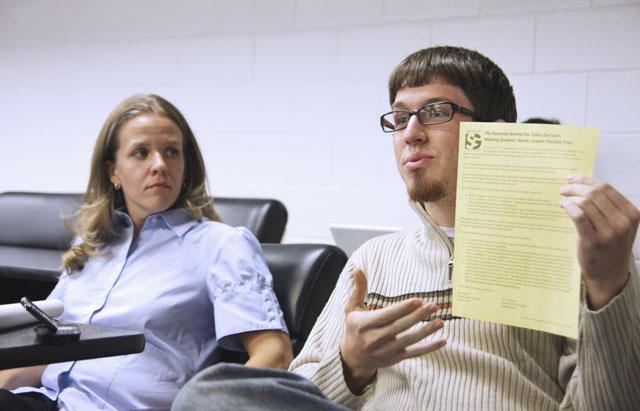
© 2009 NCSU Student Media
Students and Student Government members voice their concerns and opinions at the Student Government forum on the reconstruction of Talley Student Center. Kyle O’Donnell, a sophomore in nuclear engineering and representative for seniors in the College of Engineering, holds up “The Rationale Behind the Talley Decision” to convey how the decision is in the best interest for current and future students in regards to fees. Photo by Erica Heller
Last night, the Student Senate held an open forum in response to the protest conducted by the Rally Against Talley Facebook group last week. The open forum was a continuation of last week’s opportunity to allow students to voice their opinions.
A total of eight students appeared at some point during last night’s forum, along with about half of the senate. The eight students primarily consisted of those central to the Rally Against Talley protest, including Vidya Sankar, the movement’s organizer.
Despite the reduced student turnout compared to the over 50 people who appeared last week, the Senate held the open forum as promised. It was organized to promote discussion, intentionally informal, and students were allowed to address the Senate as a whole, or speak to individual senators.
Eugene Yap, a senior in chemistry, said he felt the open forum was a good idea, allowing students to have their voices heard.
“It’s just a shame not that many students showed up,” he said. “The senate is handling the discussion pretty well. They’re trying to be as democratic as possible.”
Yap said there could have been a number of reasons why so few people showed up, primarily because not enough students knew about the event.
“I heard about it through my friends. Not enough students were adequately informed about this,” Yap said. “Also some students may have given up. They tried to protest at the first one, but it didn’t work out for them.”
Sen. Sarah Lindh agreed the event could have been better advertised, but more opportunities would be available in the future.
“The reason students didn’t come was the event was not publicized much. The more people know about it generally the more people will show up,” Lindh said. “I love the idea. I want the discussion to continue and let students speak freely.”
“The open forum was a step in the right direction, although I wish the conversation could have been more debatable so more student feelings could be expressed,” Lindh said.
Stuart Bernholc, a freshman in the first year college, said the forum was held to both inform and pacify students.
“The Senate was surprised by the discontent expressed last week. The open forum was held to satisfy the active student body,” he said. “But it does show they are moving forward on the issue.”
“The Senate handled the forum fine, although a small number of responses did not exactly answer the question,” Bernholc said. “But that is because they want to answer every question and indirect responses were due to miscommunication.”
Berholc said the reason the turnout was smaller last night was a majority of the protesters last week left when they thought the discussion was over, before the open forum was announced.
“The Senate did an adequate job letting people know this was happening. If [the protesters] had waited, they would have heard about it,” Berholc said.
Kelli Rogers, the Student Senate president, said the Senate took the necessary steps to inform the students. A possible explanation for low turnout was the Senate meetings are simply more public than forums.
“We talked to other student leaders as well as mentioned it at the senate meeting last week. We went through Facebook groups and the Technician, the major sources which drew people to last week’s protest.”
Rogers said the open forum was an opportunity to continue the discussion from last week’s protest, and said she felt [the Senate] got a lot from it despite the low turnout.
“There was a good representation of the student voice present at the forum,” she said. “The Senate and student leaders at the forum gained a lot from student input and are coming closer to an understanding on the concerns brought by students.”
Rogers said the Senate did a good job explaining to students how the decisions on the fee referendum were made, which was what a lot of the questions were on.
“The discussion was focused on change and making an impact instead of just argument. There was a lot of productive debate; not heated debate because the original decision was made as a result of facts and reasoning,” Rogers said. “Everyone left learning something and able to move forward.”
Vidya Sankar said she felt the forum did a decent job letting people speak, but did not really answer questions.
“A lot of the answers were rather roundabout,” she said. “The answers seemed to be exact regurgitations of what we heard earlier, without real justification.”
Sankar said she felt the low turnout was due to the lack of advertising by the Student Government.
“I believe the low turnout was because the forum was very lightly publicized, there very little knowledge provided, and very little exposure to the students. The students were uninformed,” she said.
Sankar said informing students was important because student involvement is very important.
“The purpose of the forum is to foster student participation. It is important because we also need to start holding administration accountable,” she said. “The Senate should attempt to restore student trust by being more vocal with criticisms of the administration on major issues in the future.”
Improving trust and transparency should be the next step for SG, and the next step for her and student activists will be a protest being held in the Brickyard this Friday at noon, Sankar said.